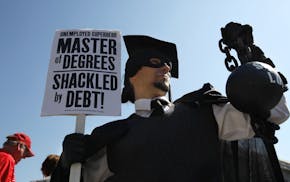Manifest destiny didn't come cheaply, and maybe that explains why the United States emerged as one nation, under debt.
True, there was that time, in 1835, when we owed nothing to anybody. But a year later, we had reverted to our old ways of living beyond our means.
That's the way it's been for 234 years: Always a debtor nation, but never a deadbeat. And that isn't likely to change despite the news Monday that the credit ratings firm Standard & Poor's had lowered its outlook on the nation's creditworthiness to negative.
Absent a deficit reduction deal by 2013, S&P warned, the United States could lose its vaunted AAA rating, which would drive up borrowing costs for everyone.
The downgrade, released early Monday, seemed timed for maximum news value, and it inspired some panicked selling on the three major U.S. stock indexes.
But bond investors, owed a collective $9 trillion in U.S. debt, greeted it with a yawn.
Why? Consider the source. Whatever credibility S&P or the other major credit rating agency, Moody's, had with investors and the public evaporated in the wake of the subprime meltdown. The Financial Crisis Inquiry Commission called them "essential cogs in the wheel of financial destruction," helping trigger the global financial crisis that, ironically, fed huge budget deficits around the world.
But credit agencies had a credibility problem even before their hunger for fees made them complicit in the shilling of fraudulently rated mortgage securities. Too often, they were like the fire marshal who arrived after the building had already burned down. Enron, for example, didn't lose the investment-grade rating on its debt until four days before it went bankrupt.
"Having Standard & Poor's put the U.S. Treasury on some sort of credit quality watch list is a little like TEPCO issuing a white paper on nuclear reactor best practices," said Biff Robillard, a Deephaven money manager. "While it may be true no one knows more about what can go wrong, we're going to rely on them now?"
In other words, it's not exactly news that the United States has a budget problem, or that Republicans and Democrats can't agree on how to solve it.
Still, the S&P announcement feeds into the public's anxiety over our ever-swelling national debt, which now sits at more than $14 trillion, roughly 100 percent of our gross domestic product and almost $49,000 for every American. Next month, Congress will either have to raise the debt ceiling or allow the nation to default on some of its obligations.
Some lawmakers and their constituents support a default, deeming it a cleansing event needed to force the country to shore up its finances. They are wrong. America defaulting on its debt would trigger a chain of mostly bad events.
U.S. debt would lose its status as the safest, most secure investment in the world, the place to put your money when you absolutely want to make sure you don't lose it. The cost to borrow money, for companies, individuals and the government, would soar, crippling the economy. Take a look at what's happening in Greece and Ireland.
And while you would never know it from the rhetoric, this is not the first time lawmakers have been called on to raise the debt ceiling. Congress did so seven times during President George W. Bush's two terms, a period when operating surpluses gave way to deficits and our outstanding debt nearly doubled to $10 trillion. Republicans voted mostly in favor of those increases, while some Democrats, including Barack Obama, opposed them.
The good news is Republicans and President Obama have offered plans to cut the deficit by at least $4 trillion over the next 10 to 12 years. Bond investors may have ignored S&P's change to its ratings outlook, but that doesn't mean Wall Street won't be watching what happens.
ericw@startribune.com • 612-673-1736

Wieffering: Time to get over debit card fees
For Thrivent and others, warnings were there

With billions in sales, some co-ops are big business
